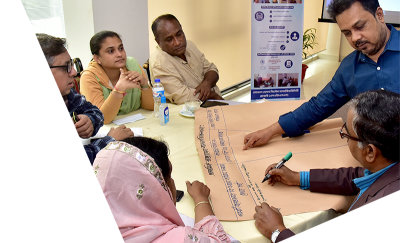Climate Risk Management Undergirds Peacebuilding in Uganda


CRM Benefits Advance Stability and Resilience
In the Karamoja region of northern Uganda, conflict frequently erupted among herders and communities over access to water and pasture for livestock.
“We experienced drought, sometimes for 90 days,” said John Ekamarpus Longora, the leader of a kraal, a mobile enclosed livestock camp set up by herders during the dry season. “The trees dry, water levels and sources go down, and conflicts tend to arise because of a scramble for natural resources.”
"Historical data show that climate change is aggravating this problem, lengthening the dry season when violence is most likely," said Robert Bagyenda of USAID Uganda.
As detailed in a 2021 case study about USAID’s Securing Peace and Promoting Prosperity (EKISIL) Activity—produced by Abt and our partner, Carson+Co Global—implementing climate risk management (CRM) actions increased and protected the benefits of this peacebuilding project in Karamoja.
Through case studies and blogs, the Abt-led Climate Integration Support Facility details how USAID projects around the world have responded to USAID’s 2016 CRM policy, quantifying and even monetizing benefits. The case study in Uganda explained how EKISIL enabled formal and informal institutions to peacefully oversee and share communal natural resources by developing community and government agreements, policies, and resource management processes.


Abt found EKISIL’s CRM actions increased livestock value, strengthened the management and productivity of livestock watering facilities—primarily the 2.3 million cubic meter Kobebe Reservoir—and improved access to natural resources and fertile land. Indirectly, these actions also diversified options to generate household income and boosted women’s engagement in trade, economic, and peacebuilding opportunities.
Integrating CRM in activity design and implementation enabled the project to work with communities to anticipates more intense droughts, higher climate variability, and greater risk of conflict due to resource scarcity.
Read More
Environment & Energy in Sub-Saharan Africa

USAID Catalytic Action through Localized Policy Solutions (CATALYST)
USAID CATALYST is a global program that helps countries build policy and institutional frameworks that enable greater investment in sustainability and resilience across sectors.

The Next Phase of Financing for Resilience
In our webinar, explore innovative financial strategies to enhance climate resilience and scale finance for sustainable development in emerging markets.

Building Climate Resilience Through Private Sector Partnerships
The Partnership for Climate Action, led by USAID CACCI, helps the private sector contribute to climate resilience through investment and innovation.

Health Systems Research (HSR) 2024
Abt Global is exhibiting and presenting at Health Systems Research (HSR) in Nagasaki, Japan in November 2024.